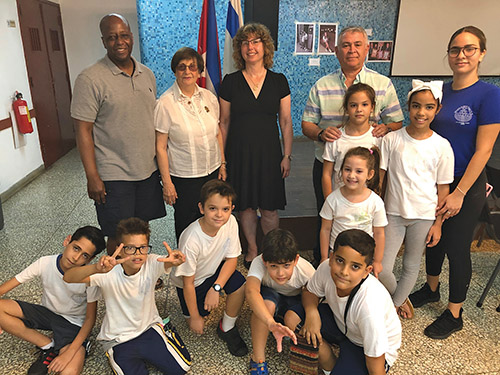

Last week, I joined Assemblyman Gordon Johnson and two dozen legislators, family members and staff on a New Jersey legislative delegation to Cuba. We met with representatives from the Ministry of Foreign Affairs and Foreign Commerce, toured a school for children with disabilities and a medical clinic. Although the purpose of the trip was to improve the U.S.-Cuba relationship, I undertook this trip to learn firsthand about the Cuban Jewish community.
On Sunday April 7th, Assemblyman William Spearman from Camden (representative of the 5th legislative district) and I met with Adela Dworin, President of Cuba’s Jewish community. She explained that in the early twentieth century, Sephardic Jews from Syria and Turkey emigrated to Cuba and in the 1920s and 30s a big wave of Jews emigrated from Eastern Europe. In 1959, there were 15,000 Jews in Cuba; five synagogues in Havana, six Jewish elementary schools and a Jewish high school. Most Jews left after the Cuban Revolution, as private schools were closed and private businesses were confiscated. Private religious practices were forbidden, but not because of anti-Semitism. In 1990, with the collapse of the socialist countries, there was an opening for religion and a revival of the Jewish community with the help of the American Joint Distribution Committee, UJA, Bnai Brith and sister synagogues. Today there are 1,000 Jews in Havana and 200 Jews in the rest of the country. There is a visiting rabbi that comes every few months from Chile.
The Jewish children attend public school during the week. On Sunday, the Jewish Sunday school accommodates children ages 4 to 18 and teaches them Hebrew, history, tradition and religion. The children educated since the Sunday school reopened know more about Judaism than their parents and grandparents. The children attend this school at no cost, and are privileged as they are given breakfast, school supplies and have special opportunities such as sponsorships to participate in the Maccabi games. Many later have the opportunity to travel to Israel on Birthright Israel.
Assemblyman Spearman and I were honored with a special dance performance from the children. They proudly recited Brachot to us. They were learning about Passover and in a separate classroom, adults were engaged in a class about Passover as well. The Jewish community was anticipating an annual shipment from the Canadian Jewish community with containers filled of matzah, gefilte fish, horseradish and kosher wine which is distributed to all the Jews in the country. In Havana, there will be two public Seders, one each night, each for 150 people. It was heartwarming to see that the Jewish community despite economic hardships is getting support from the worldwide Jewish communities and organizations.
By Dr. Lisa Wisotsky
Dr. Lisa Wisotsky is an Englewood community leader who currently serves on the Englewood Planning Board.













